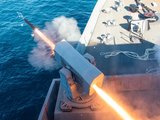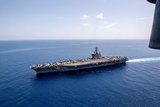DIMDEX: Saab promotes maritime surveillance
Offering up its maritime surveillance capabilities to the Middle-East at DIMDEX, Saab has described a ‘complex’ maritime environment in the Arabian Gulf.
Speaking to Shephard at the event on 26 March, Tomas Samuelsson, head of market areas Europe and Middle-East, outlined difficult political, geographical and economic inputs in the region but stressed that maritime surveillance provided an important tool to protect trade routes and counter-piracy and asymmetric threats.
Samuelsson also highlighted an increased demand for multi-functionality and warned that future requirements would not be as ‘predictable’ as they have been in the past. Requirements have become ‘more fast and adaptive’,
Already have an account? Log in
Want to keep reading this article?
More from Naval Warfare
-
![European navies line up $105.8 billion in unawarded contracts for 2026]()
European navies line up $105.8 billion in unawarded contracts for 2026
France, Germany and Italy lead the way on unawarded naval defence opportunities that could be awarded this year, but across Europe countries are ramping up their spending efforts to face geopolitical challenges.
-
![Spain’s F100 upgrade mirrors Aegis modernisation paths in allied navies]()
Spain’s F100 upgrade mirrors Aegis modernisation paths in allied navies
The Spanish Navy’s Alvaro de Bazan-class of air defence frigates will receive the latest Aegis Weapon System technology among other modernisations to extend the service life to 2045.
-
![UK’s Fleet Solid Support ship programme deemed on track despite steel supply concerns]()
UK’s Fleet Solid Support ship programme deemed on track despite steel supply concerns
Shipbuilders are saying the programme is going ahead on time as the government estimates 7.7 million tonnes of steel are needed for 2026 infrastructure projects.
-
![Raytheon unveils details of its proposal for the US Navy/NATO ESSM Next Significant Variant]()
Raytheon unveils details of its proposal for the US Navy/NATO ESSM Next Significant Variant
In an exclusive interview with Shephard, Raytheon’s VP of Shipboard Missiles disclosed what improvements the company plans to offer for the Sea Sparrow NSV.























